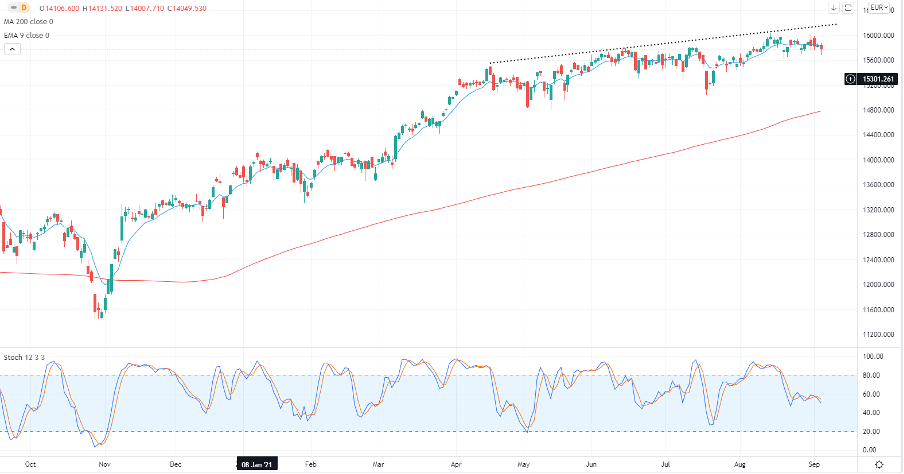- English (UK)
The GER40 - trading the biggest shakeup in the DAX since 1988

However, in recent times we’ve seen the 10-day realised volatility fall to 5% and the lowest levels since May 2019, while 30-day volatility (now 7.11%) resides at the lowest reading since 2017. These measures of index volatility and movement also show that volatility in the German DAX is indeed lower than any other major equity index.
In a world where traders are looking for movement, as well as compelling expected returns, the DAX has become relatively sanguine and equity index trader capital have flocked towards the US500, US30 and into Asia, notably the HK50. Although, volatility in these markets is considered far from lively.
DAX 30 daily chart

(Source: Tradingview - Past performance is not indicative of future performance.)
We can look forward where options pricing shows implied measures of volatility not far off multi-year lows – however, one questions if this volatility is priced incorrectly and with some big event risk on the horizon, it’s not hard to envisage a world where this dynamic changes, volatility rises and the GER40 becomes one of the most traded equity indices in our universe of index products by retail traders.
Catalysts to make the GER40 fire up again
The list of volatility catalysts are building, and whether the trader flow is aimed at longs, or shorts is yet to be seen, but we see an election on 26 September that could get messy. The ECB is moving closer to a world where they slow the pace of asset purchases (under its PEPP program) and importantly there are major changes in the composition of the DAX that may change both the volatility in the index, but also the attraction of the index and the underlying constituents for foreign investors.
The main change is the 10 new companies entering the index on 20 September – effectively making it the DAX 40. Along with other measures, these additions constitute the biggest change in the equity index since its inception in 1988. Incoming corporates include Airbus, Siemens Healthineers, Porsche, Puma, Zalando, Symrise, Sartorius, Hellofresh, Brenntag and Qiagen.
Airbus is the big inclusion with a market cap of E89.9b, with Siemens Healthineers the next biggest, with a market cap of E66B.
By way of index composition – adding 10 new stocks reduces the concentration risk we see from having 30 stocks and by increasing the market cap by over E350b the diversification, in theory, lowers the variance. However, the additions challenge the way investors look at the German DAX – consider that 40% of the index constituents pay an expected dividend yield of over 3% and can be influential on the broader index as the DAX is quoted as a total return index – that is, the price you trade reflects both the move in the price of the underlying stocks but also the dividend returns.
By diluting the weighing of some of the higher dividend-paying stocks and increasing the weighting towards growth we may see the index command a higher P/E multiple, and have a higher beta to other markets, with increased volatility. It may even make international investors look twice at the index and re-establish the German DAX as a front-of-mind instrument for traders once again.
The GER40 as a play on global growth
We can see the index will maintain a strong weight towards international cyclical stocks with a skew towards chemicals, industrials, and technology. Over 75% of corporates derive sales from outside of Germany, and one could argue the new additions increase the global international exposure, notably towards Europe and China.
After the inclusion, the DAX becomes even more sensitive to world traders than the S&P500, FTSE100 and other major EU bourses and holds the highest beta of equity returns to world trade – this means if we do see global growth being called into question on a more sustained basis, which I’d argue is playing out now, the DAX may well underperform and attract greater short-selling interest.
It all suggests a livelier environment in the months ahead, and with our reduced spreads on the GER40 and industry-leading top of book liquidity, put the GER40 on the radar for increased movement – because movement results in opportunity for traders. Trade the opportunity with Pepperstone.
Related articles
Ready to trade?
It's quick and easy to get started. Apply in minutes with our online application process.
The material provided here has not been prepared in accordance with legal requirements designed to promote the independence of investment research and as such is considered to be a marketing communication. Whilst it is not subject to any prohibition on dealing ahead of the dissemination of investment research we will not seek to take any advantage before providing it to our clients.
Pepperstone doesn’t represent that the material provided here is accurate, current or complete, and therefore shouldn’t be relied upon as such. The information, whether from a third party or not, isn’t to be considered as a recommendation; or an offer to buy or sell; or the solicitation of an offer to buy or sell any security, financial product or instrument; or to participate in any particular trading strategy. It does not take into account readers’ financial situation or investment objectives. We advise any readers of this content to seek their own advice. Without the approval of Pepperstone, reproduction or redistribution of this information isn’t permitted.
.jpg?height=420)
